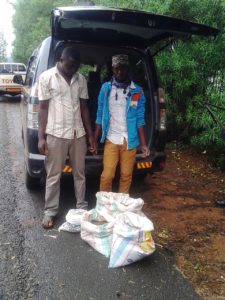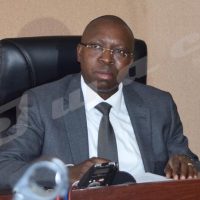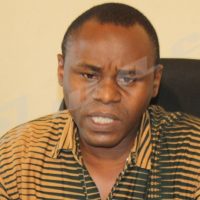Recent foiled mineral smuggling attempts were destined to Rwanda that is reported to have an expending trade of coltan.

Illegal coltan and cassiterite traffickers arrested in Kirundo as they attempted to smuggle the minerals to Rwanda.
Despite reports of renewed mineral smuggling failed attempts, the police and the Burundi Mining Office (OBM) note a remarkable decrease in illicit mineral traffic due to dissuasive actions and the change of people’s mentality.
On Thursday 23 March, the police arrested two illegal traffickers in the northern province of Kirundo at the border with Rwanda with 119 kg of cassiterite and 56.5 of coltan.
A similar incident happened in the bordering northern province of Kayanza mid-January when 13 suspects including 12 Rwanda nationals were arrested on 12 January and judged on 13 of the same month for illicit extraction and trade of coltan. The two brains of the crime (Emmanuel Bampanze, a Burundian and François Nkundiye, a Rwandan) were sentenced to 15 years in prison while others were sentenced to 7 years and 6 months.
The International Monetary Fund, the World Bank, the African Development Bank, and the European Union have noted that the mining sector in Burundi can potentially contribute significantly to economic growth through job creation, improvement of infrastructures and citizen’s income increase.
The government of Burundi, PACT, and others say Burundi is rich in natural resources. Minerals include gold, coltan, cassiterite, wolframite, valium, Nickel mines and others.
A local corruption watchdog, Olucome, has observed in a letter to the Ministry of Energy and Mining that the mining sector contributes less than 1% to the national economy. The real contribution is far inferior to the potentialities of the sector. In the letter signed on 16 March, the watchdog said the failure of the mining industry in Burundi is due to the mismanagement and corruption scourging the sector.
Jean Claude Nduwayo, Director General of the Burundi Mining Office (OBM), says there has been remarkable improvement in the mining sector since OBM started operating in 2016. He says the positive developments have also been recognized by the international NGO PACT.
Strategies against illegal traffic
Nduwayo says illicit extraction and trade of minerals has been discouraged by the harsh punishment offenders undergo.The Burundi Mining Code provides for heavy prison sentences and fines for offenders.
He also says “mining communities have understood how the country loses from illegal traffic and how legal extraction and trade benefits both the country and the workers in the mining industry”.
In the strategies to discourage illicit mining and trade, the Mining Office has organised workshops with the civil administration, the security forces, the secret services and the population to raise awareness on the prevention of illicit traffic.
“It’s a work of synergy”, says Pierre Nkurikiye, Spokesman for the Burundi National Police.
He says the eradication of illegal trade is not easy because “there are people who are ready to risk everything because they get much money from it”. Sometimes legal miners can also breach the law and engage in illegal traffic.
The letter Olucome sent to the Minister of Energy and Mining urged Burundi to accelerate and complete the process to become a member of the Extractive Industry Transparency Initiative (EITI).
The watchdog warned that any delay by Burundi to become a member of the EITI would result in, among many other consequences, the renewal of excessive illicit practices in the mining sector, the financing of conflict in the country, and practices which are against national interests.


















 IWACU Open Data
IWACU Open Data

